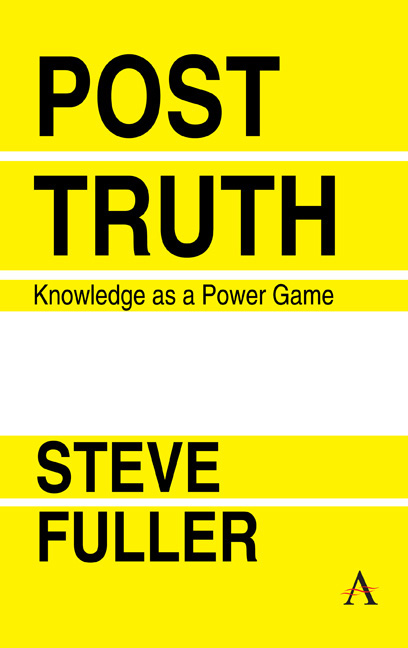Book contents
- Frontmatter
- Dedication
- Contents
- Acknowledgements
- Introduction: Science and Politics in a Post-Truth Era: Pareto's Hidden Hand
- 1 Brexit: Political Expertise Confronts the Will of the People
- 2 What Philosophy Does and Does Not Teach Us about the Post-Truth Condition
- 3 Sociology and Science and Technology Studies as Post-Truth Sciences
- 4 The Post-Truth about Academia: Undiscovered Public Knowledge
- 5 Science Customization: A Project for the Post-Truth Condition
- 6 The Performance of Politics and Science on the Playing Field of Time
- 7 Forecasting: The Future as the Post-Truth Playground
- The Argument in a Nutshell
- Glossary
- References
- Index
5 - Science Customization: A Project for the Post-Truth Condition
Published online by Cambridge University Press: 14 July 2018
- Frontmatter
- Dedication
- Contents
- Acknowledgements
- Introduction: Science and Politics in a Post-Truth Era: Pareto's Hidden Hand
- 1 Brexit: Political Expertise Confronts the Will of the People
- 2 What Philosophy Does and Does Not Teach Us about the Post-Truth Condition
- 3 Sociology and Science and Technology Studies as Post-Truth Sciences
- 4 The Post-Truth about Academia: Undiscovered Public Knowledge
- 5 Science Customization: A Project for the Post-Truth Condition
- 6 The Performance of Politics and Science on the Playing Field of Time
- 7 Forecasting: The Future as the Post-Truth Playground
- The Argument in a Nutshell
- Glossary
- References
- Index
Summary
Protscience: Science Upfront and Personal
In a post-truth world, the very idea of a ‘scientific consensus’ may be regarded with suspicion, but science as such is by no means dismissed. On the contrary, it is taken personally. This change in attitude compares to the shift that occurred during the Protestant Reformation, the moment when Christianity ceased being a unified doctrine delivered with enormous Latinate mystique from a ‘high church’ pulpit. Thereafter it became a plurality of faiths, whose followers stake their lives on their own distinctive understandings of the Scriptures. In the case of science, I have dubbed this process Protscience, short for ‘Protestant Science’ (Fuller 2010: chap. 4), by which I mean to include a pattern evident in the parallel ascendancies of, say, intelligent design theory, alternative medicine and Wikipedia.
The Protestant Reformation was the first step on the road to the secularization of Europe, which Max Weber famously described as the ‘disenchantment’ of the Western mind. Protscience's relationship to this process is ambiguous, as it both disenchants scientific authority and re- enchants science itself as a lifeshaping form of knowledge (Fuller 2006b: chap. 5). In any case, Protscience takes very seriously the idea that any form of knowledge that aspires to universal scope for its claims must have universal appeal for its believers. In more fashionable language, it involves the reflexive shaping of self and world to enable one to live – or die, as the case may be – with whatever one happens to believe.
Interestingly, just as the original Protestants were demonized by Catholics as ‘atheists’ for their refusal to defer to papal authority, today's Protscientists are denounced as ‘anti- science’. In both cases, however, the people concerned are generally well educated and quite respectful of the need to provide reasons and evidence for their beliefs. Not surprisingly, then, Protscientists make much of the hypocrisy of established authorities that fail to live up their own avowed epistemic standards. Thus, any report of scientific fraud is grist for the Protscience mill, yet one more reason to take matters of knowledge into one's own hands before the entire enterprise of enquiry becomes corrupt.
Unsurprisingly, just as Catholic theologians said of Protestant readings of the Bible during the Reformation, scientists have complained that this availability of information has only served to foster misunderstanding and charlatanry.
- Type
- Chapter
- Information
- Post-TruthKnowledge as a Power Game, pp. 107 - 134Publisher: Anthem PressPrint publication year: 2018

